Contents
- Incumbents
- Events
- Ongoing
- January
- February
- June
- July
- October
- November
- December
- Deaths
- See also
- References
| |||||
| Decades: | |||||
|---|---|---|---|---|---|
| See also: | Other events of 2022 Timeline of Ethiopian history | ||||
Events in the year 2022 in Ethiopia .
| |||||
| Decades: | |||||
|---|---|---|---|---|---|
| See also: | Other events of 2022 Timeline of Ethiopian history | ||||
Events in the year 2022 in Ethiopia .

Benishangul-Gumuz is a regional state in northwestern Ethiopia bordering Sudan. It was previously known as Region 6. The region's capital is Assosa. Following the adoption of the 1995 constitution, the region was created from the westernmost portion of the Gojjam province, and the northwestern portion of the Welega Province. The name of the region comes from two peoples – Berta and Gumuz. Also, the flag is similar to Palestine.
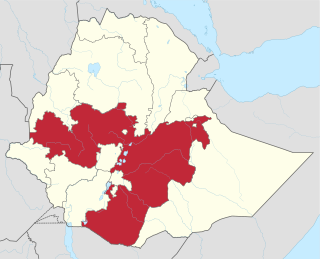
The Oromo conflict is a protracted conflict between the Oromo Liberation Front (OLF) and the Ethiopian government. The Oromo Liberation Front formed to fight the Ethiopian Empire to liberate the Oromo people and establish an independent state of Oromia. The conflict began in 1973, when Oromo nationalists established the OLF and its armed wing, the Oromo Liberation Army (OLA). These groups formed in response to prejudice against the Oromo people during the Haile Selassie and Derg era, when their language was banned from public administration, courts, church and schools, and the stereotype of Oromo people as a hindrance to expanding Ethiopian national identity.
The Oromia–Somali clashes flared up in December 2016 following territorial disputes between Oromia region and Somali region's Government in Ethiopia. Hundreds of people were killed and more than 1.5 million people fled their homes. The conflict ended in 2018.

Abiy Ahmed Ali is an Ethiopian politician serving as the third Prime Minister of Ethiopia since 2018, and as a leader of the Prosperity Party since 2019. He was awarded the 2019 Nobel Peace Prize "for his efforts to achieve peace and international cooperation, and in particular for his decisive initiative to resolve the border conflict with neighbouring Eritrea". Abiy served as the third chairman of the Ethiopian People's Revolutionary Democratic Front (EPRDF) that governed Ethiopia for 28 years and the first person of Oromo descent to hold that position. Abiy is a member of the Ethiopian parliament, and was a member of the Oromo Democratic Party (ODP), one of the then four coalition parties of the EPRDF, until its rule ceased in 2019 and he formed his own party, the Prosperity Party.
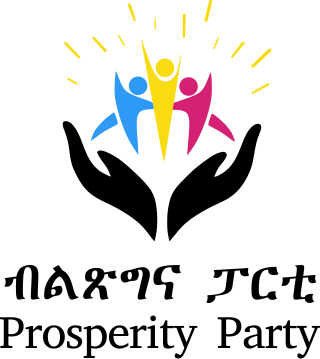
The Prosperity Party is a political party in Ethiopia that was established on 1 December 2019 as a successor to the Ethiopian People's Revolutionary Democratic Front (EPRDF) by incumbent Prime Minister Abiy Ahmed. The merger into a countrywide party is part of Abiy's general policy of distancing the country's politics from ethnic federalism. It ran for the first time in the 2021 general election.
Events of 2020 in Ethiopia.

The Tigray War was an armed conflict that lasted from 3 November 2020 to 3 November 2022. The war was primarily fought in the Tigray Region of Ethiopia between forces allied to the Ethiopian federal government and Eritrea on one side, and the Tigray People's Liberation Front (TPLF) on the other.

The Benishangul-Gumuz conflict was an armed conflict mostly in the Metekel Zone of the Benishangul-Gumuz Region in Ethiopia that started in 2019, until peace agreement signed between the rebel groups and the government of Ethiopia in October 2022.
Events in the year 2021 in Ethiopia.
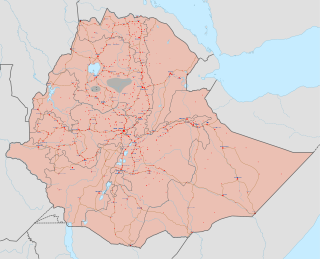
Following the 2018 dissolution of the ethnic federalist, dominant party political coalition, the Ethiopian People's Revolutionary Democratic Front, there was an increase in tensions within the country, with newly resurgent regional and ethnically based factions carrying out armed attacks on military and civilians in multiple conflicts throughout Ethiopia.

The OLA insurgency is an armed conflict between the Oromo Liberation Army (OLA), which split from the Oromo Liberation Front (OLF) in 2018, and the Ethiopian National Defense Force (ENDF), continuing in the context of the long-term Oromo conflict, typically dated to have started with the formation of the Oromo Liberation Front in 1973.
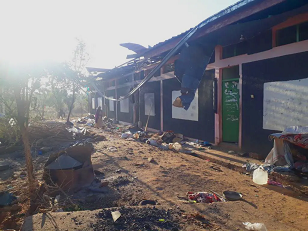
In the late hours of 7 January 2022, the Ethiopian Air Force (ETAF) carried out an airstrike on a camp for internally displaced persons set up in Dedebit Elementary School, located in the Tigray Region of Ethiopia. Between 56 and 59 people were killed in the attack, and at least 30 others were left injured.

Abiy Ahmed's tenure as prime minister of Ethiopia began on 2 April 2018 with his swearing-in at the Ethiopian parliament, succeeding Hailemariam Desalegn. Abiy is the first person of Oromo descent to hold the office, and became chair of the ruling Prosperity Party after the dissolution of the Ethiopian People's Revolutionary Democratic Front (EPRDF) in November 2019.

Since the 1990s, the Amhara people of Ethiopia have been subject to ethnic violence, including massacres by Tigrayan, Oromo and Gumuz ethnic groups among others, which some have characterized as a genocide. Large-scale killings and grave human rights violations followed the implementation of the ethnic-federalist system in the country. In most of the cases, the mass murders were silent with perpetrators from various ethno-militant groups— from TPLF/TDF, OLF–OLA, and Gumuz armed groups.
The 1995 Ethiopian Federal Constitution formalizes an ethnic federalism law aimed at undermining long-standing ethnic imperial rule, reducing ethnic tensions, promoting regional autonomy, and upholding unqualified rights to self-determination and secession in a state with more than 80 different ethnic groups. But the constitution is divisive, both among Ethiopian nationalists who believe it undermines centralized authority and fuels interethnic conflict, and among ethnic federalists who fear that the development of its vague components could lead to authoritarian centralization or even the maintenance of minority ethnic hegemony. Parliamentary elections since 1995 have taken place every five years since enactment. All but one of these have resulted in government by members of the Ethiopian People's Revolutionary Democratic Front (EPRDF) political coalition, under three prime ministers. The EPRDF was under the effective control of the Tigray People's Liberation Front (TPLF), which represents a small ethnic minority. In 2019 the EPRDF, under Abiy, was dissolved and he inaugurated the pan-ethnic Prosperity Party which won the 2021 Ethiopian Election, returning him as prime minister. But both political entities were different kinds of responses to the ongoing tension between constitutional ethnic federalism and the Ethiopian state's authority. Over the same period, and all administrations, a range of major conflicts with ethnic roots have occurred or continued, and the press and availability of information have been controlled. There has also been dramatic economic growth and liberalization, which has itself been attributed to, and used to justify, authoritarian state policy.
The Amhara Association of America (AAA) (Amharic: የዐማራ ማህበር በአሜሪካ) is a non-profit organization based in Charlotte, North Carolina, focused on advocating for the human rights of the Amhara people in Ethiopia.
Events in the year 2023 in Ethiopia.
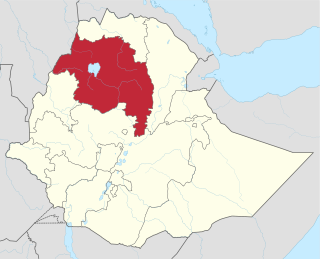
The War in Amhara is an armed conflict in the Amhara Region of Ethiopia that began in April 2023 between the Amhara regional forces along with the Fano militia, and the Ethiopian government. The conflict began after the Ethiopian military raided the Amhara Region to disarm the Amhara Special Forces and other regional allies, which resulted in resistance of local armed forces and a series of protests in Gondar, Kobo, Sekota, Weldiya and other cities on 9 April.
The OLA peace process is a set of negotiations, agreements and actions to end the insurgency of the Oromo Liberation Army (OLA), which split from its wing, the Oromo Liberation Front (OLA) and rebels against the Ethiopian federal government since 2018. The Oromia region has experienced prolong conflict and instabilities first initiated by OLF with successive Ethiopian government since 1973.